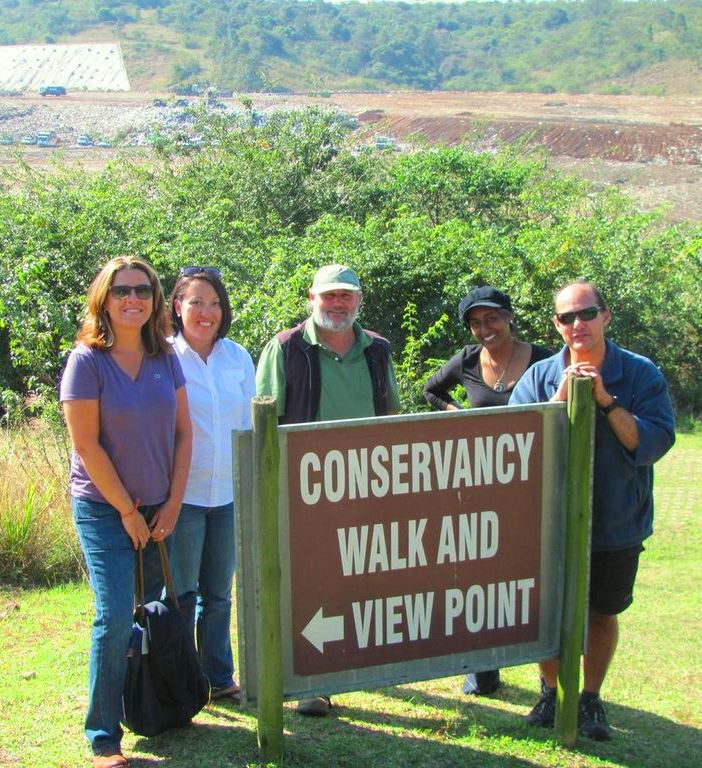
Situated on the east coast of South Africa, the city of Durban is currently grappling with the effects of climate change. Interested in how they might regionalize their efforts to mitigate sea level rise and increase biodiversity and ecosystem services, Durban looked to ICMA’s CityLinks program. As a result, the CityLinks team utilized ICMA’s network of professionals to find an American coastal city that had experience with these same issues, and Fort Lauderdale, Florida, answered their call.
CityLinks facilitated a city-to-city exchange trip in late July 2013 between Fort Lauderdale, Florida, and Durban to assess the feasibility of creating a multi-municipality approach to address regional climate adaptation issues. Susanne Torriente, ICMA member and assistant city manager in Fort Lauderdale, and Dr. Jennifer Jurado, director of Natural Resource Planning and Management in Broward County, Florida, traveled to Durban to provide assistance. This exchange builds on the Durban Adaptation Charter (DAC) Implementation Guidance Workshop (IGW) in March 2013, where signatories of the charter discussed the transformation of the DAC into a governing body that could one day provide guidance on climate change adaption issues for its members.
Both Fort Lauderdale and Broward County are part of the Southeast Florida Regional Climate Compact, a consortium of counties dedicated to coordinating climate mitigation and adaptation activities. Torriente and Jurado presented the Compact to an audience of academics and municipal officials and explained how Broward, Miami-Dade, Monroe, and Palm Beach Counties used a bottom-up approach to transform a set of common challenges across Southeast Florida into a broader effort based on an understanding that the four counties could accomplish significantly more together than they could as individual entities.
Their presentation stressed the policy and administrative challenges of working across multiple counties with diverse priorities and political environments to cooperate under a common goal of community resilience through climate change initiatives. From a technical perspective, the presentation focused on the importance of developing regionally consistent methodologies for measuring vulnerabilities, baselines, and the progress that specific climate adaptation efforts have made. While the Compact began as an unfunded effort, its success has drawn both state and federal dollars to the cause and has created a model recognized nationally for its ability to overcome the social, political, and technical challenges of working across city and county boundaries.
During their trip, Jurado and Torriente met with stakeholders within the eThekwini municipality and visited the city’s landfill conservancy, a community reforestation project, and Umdloti Beach, which was severely damaged in a 2007 storm. After learning more about the challenges that Durban faces, the visitors worked with municipal staff to create an action plan outlining the initial steps Durban will take to begin a regional conversation with nearby municipalities.
While South Africa has a national Climate Change Strategy, there has been no formal initiative for municipal governments to form their own. Prior to the Fifth Annual Southeast Florida Regional Climate Leadership Summit in November 2013, Durban will initiate a series of feasibility meetings with neighboring municipalities to assess potential connections that could be made amongst those municipalities that have developed climate change strategies. For those municipalities that have yet to do so, Durban will consider creating a more integrated strategy for the future. The second half of the city-to-city exchange will allow staff from Durban to visit Fort Lauderdale and attend the summit. Among other events, Fort Lauderdale will sign the Durban Adaptation Charter in a formal signing ceremony to publicly announce its support. South African officials will meet with stakeholders from Florida counties and attend field trips that will address common water and biodiversity issues that affect both Durban and Southeast Florida.
To learn more about ICMA’s work in Durban and the CityLinks program, visit the website and the Notes from CityLinks blog, follow us on Twitter at @ICMACityLinks, and join the climate change discussion in the Climate Preparedness, Adaptation, and Resilience group on the Knowledge Network. Visit ICMA International’s site for additional information on ICMA’s other global projects.
New, Reduced Membership Dues
A new, reduced dues rate is available for CAOs/ACAOs, along with additional discounts for those in smaller communities, has been implemented. Learn more and be sure to join or renew today!
